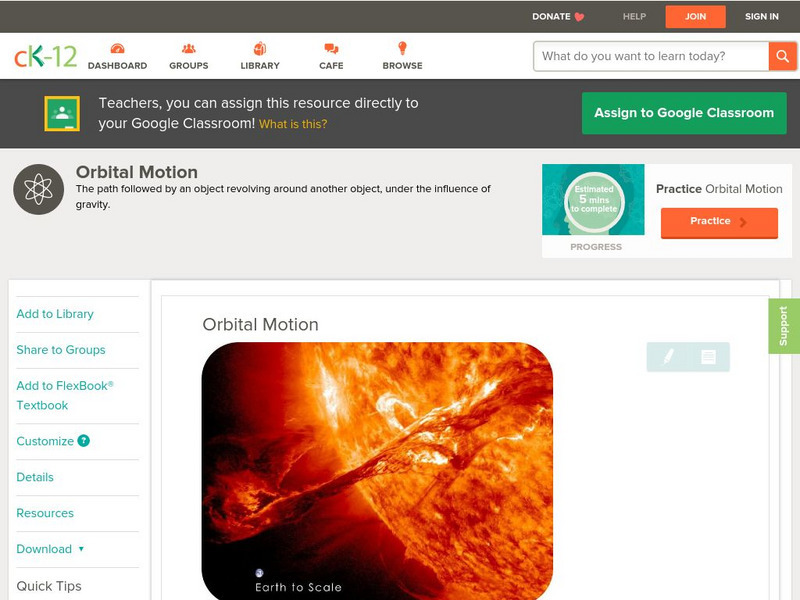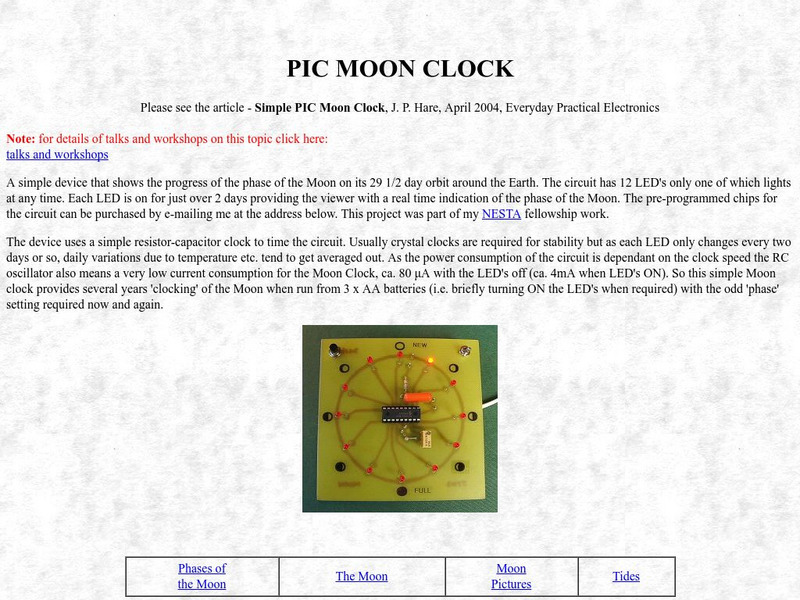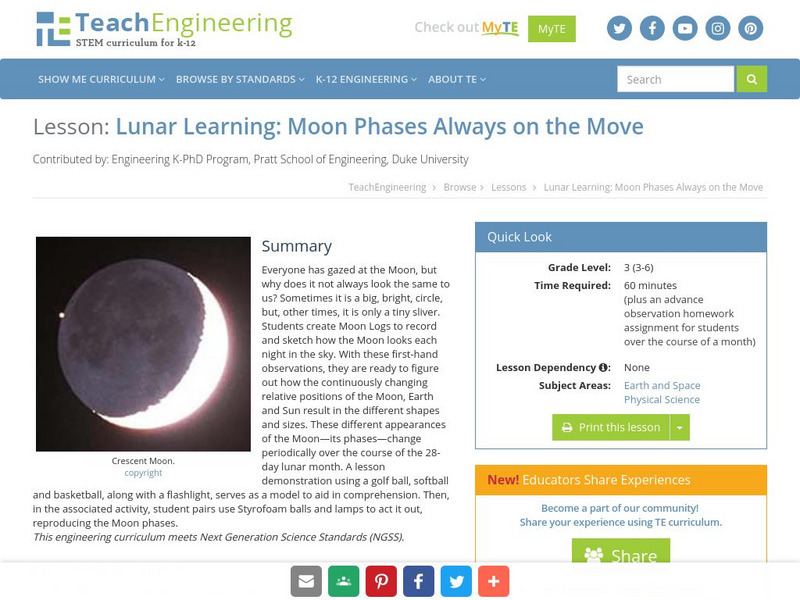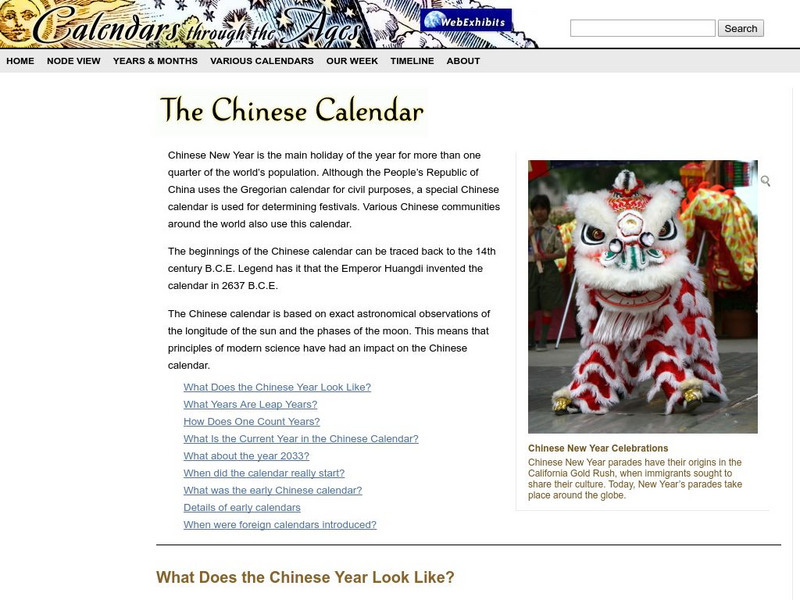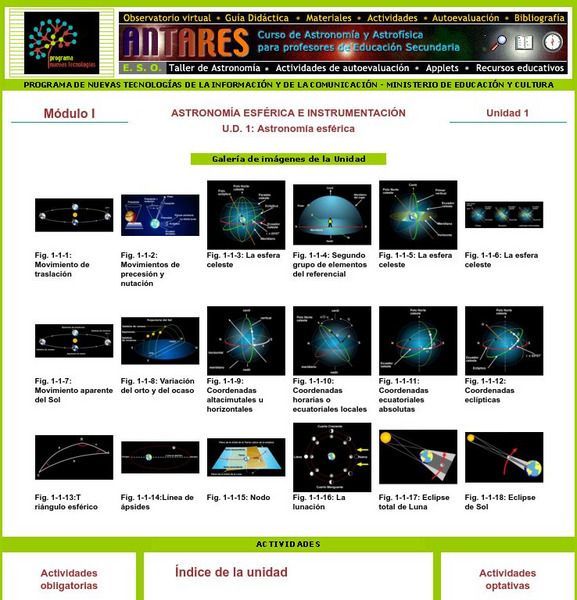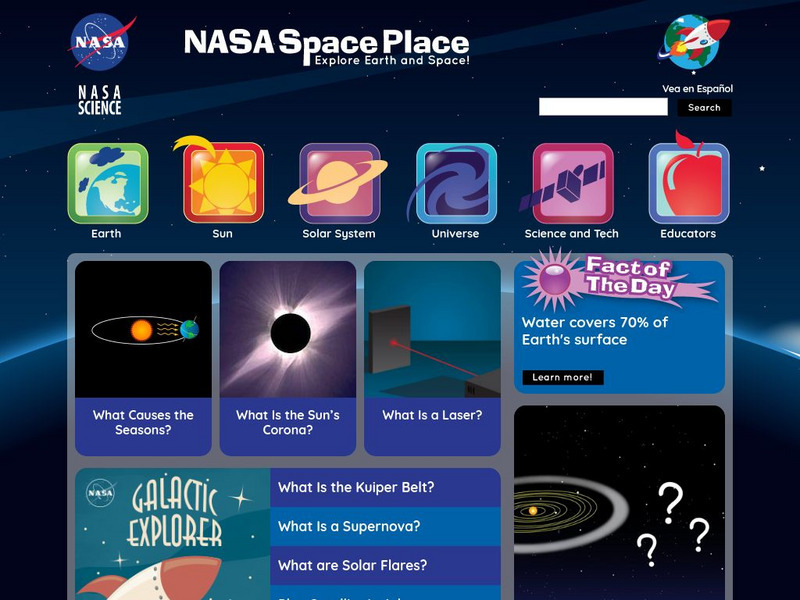Hi, what do you want to do?
Science Struck
Science Struck: Simple Ideas for Your Kid's Solar System Project
Provides detailed instructions for how to help a student make a solar system model, and additional suggestions for making a constellation poster, making a model showing phases of the moon, and creating a solar system model to scale.
CK-12 Foundation
Ck 12: First Grade Science: Sky Patterns
[Free Registration/Login may be required to access all resource tools.] Describes patterns that can be found in the movement of the Sun, Moon, and stars.
CK-12 Foundation
Ck 12: Physical Science: Orbital Motion
[Free Registration/Login may be required to access all resource tools.] Orbital motion and why it occurs, and the orbits of the Earth around the sun and the moon around the Earth.
Creative Science Centre
Creative Science Centre: Pic Moon Clock
Explains the design of a simple device that shows the progress of the phases of the Moon on its 29 1/2 day orbit around the Earth.
Annenberg Foundation
Annenberg Learner: Teachers' Lab: A Private Universe
This section is dedicated to educators to become expert instructors on topics like: distance between Earth, the Sun, and the moon, the phases of the moon, and reason for the seasons. Site includes information about how to address...
TeachEngineering
Teach Engineering: Lunar Learning
Why does the Moon not always look the same to us? Sometimes it is a big, bright, circle, but, other times, it is only a tiny sliver, if we can see it at all. The different shapes and sizes of the slivers of the Moon are referred to as...
American Geosciences Institute
American Geosciences Institute: Astronomy
Eight hands-on lessons module in which students explore the characteristics of planet Earth, its moons, the sun, the solar system, planets, and the difference between science fact and science fiction.
Better Lesson
Better Lesson: Our Stars
In this lesson, learners will observe and communicate how the stars are in the sky both day and night. The extremely detailed lesson includes photos and videos of the lesson in actions, examples of student's work, materials, parent...
National Institute of Educational Technologies and Teacher Training (Spain)
Ministerio De Educacion: El Universo, La via Lactea Y El Sistema Solar
Ministerio de Educacion: El Universo, la Via Lactea y el Sistema Solar.
Other
Calculator Cat: Current Moon Phase
Online calculator that posts up-to-the-minute phase of moon. Instructions are provided through a link on how to add this feature to your own web page.
Other
Birthday Moons: It's Just a Phase You're Going Through
Ever notice that the moon appears to change shape? Does this occur randomly or is there a pattern? Discover the answer by taking a virtual trip to the moon for your birthday.
US Navy
Astronomical Applications Department: Complete Sun and Moon Data for One Day
You can obtain the times of sunrise, sunset, moonrise, moonset, transits of the Sun and Moon, and the beginning and end of civil twilight, along with information on the Moon's phase by specifying the date and location in one of the two...
Institute for Dynamic Educational Advancement
Web Exhibit: The Chinese Calendar
This website gives very detailed information about all aspects of the Chinese calendar.
Institute for Dynamic Educational Advancement
Web Exhibit: The Jewish Calendar
This website gives very detailed information about all aspects of the Jewish calendar.
Alabama Learning Exchange
Alex: Sun, Earth, and Moon: Calendar of Events
During this lesson learners are going to take a look at moon phases and sunrise-sunset times in order to learn about daylight hours. Students discover that we do not always have the same amount of daylight each day. This lesson is best...
TeachEngineering
Teach Engineering: Lunar Lollipops
The students work in teams of two to discover the relative positions of the Earth, Sun and Moon that produce the different phases of the Moon. The students will be given a Styrofoam ball that they will attach to a pencil so that it looks...
Utah Education Network
Uen: Patterned Paragraphs
Students will learn about the importance of including specific details when writing. Students will watch the teacher model "How to Make a Peanut Butter Sandwich." Then student will replicate the process for writing with specificity as...
NASA
Nasa: Eye Safety During Solar Eclipses
This resource, which is provided for by NASA, gives great information on protecting your eyes during solar eclipses. Your eyes are very difficult to replace. Even when 99% of the Sun's surface is obscured during the partial phases of a...
Ministerio de Educación (Spain)
Ministerio De Educacion: Atronomia Esferica Modulo I Unidad 1
Recognize the major constellations and learn about the sky during the different seasons of the year. You will also be able to measure the height of the mountains of the moon.
Other
Astromador: Astronomia Para Amadores
This resources focuses exclusively on astronomy. It's packed with historical facts about space exploration, famous people who pioneered the study of stars and planets. It features chronological list of space exploration, current news,...
NASA
Nasa: The Space Place
This site from NASA's Space Place is geared towards early elementary learners. It offers detailed instructions for crafts and activities related to space, games and a teacher resource area. Students can also ask an expert at this site.
NumberNut
Number Nut: Breaking Down a Year
Math and science are uncovered when we break down the numbers in a year. Build you number sense and science knowledge in this lesson that focuses on the relationships of numbers in a calendar year. Test your knowledge with the...
Curated OER
Educational Technology Clearinghouse: Clip Art Etc: Galileo Galilei
Galileo Galilei (15 February 1564 - 8 January 1642) was a Tuscan (Italian) physicist, mathematician, astronomer, and philosopher who played a major role in the scientific revolution. His achievements include improvements to the telescope...
Other popular searches
- Phases of the Moon
- Phase of the Moon
- Science Phases of the Moon
- 8 Phases of the Moon
- Phases of the Moon Journal
- P Phases of the Moon
- Phases of the Moon Worksheet
- "Phases of the Moon






